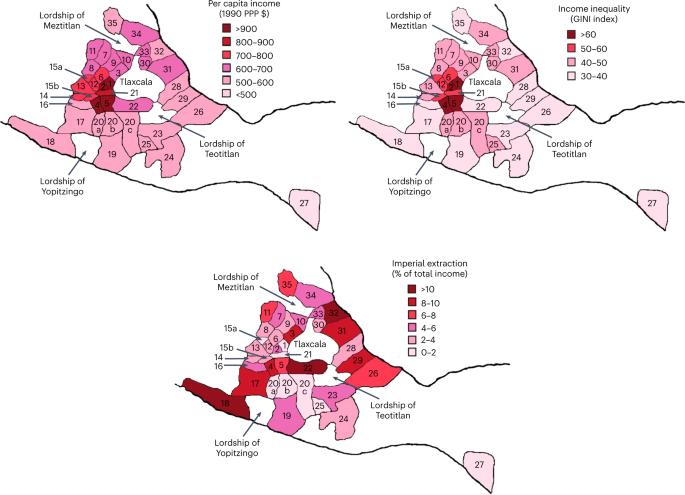西班牙征服前夕阿兹特克帝国的收入和不平等。
IF 21.4
1区 心理学
Q1 MULTIDISCIPLINARY SCIENCES
引用次数: 0
摘要
今天,拉丁美洲国家的特点是经济不平等程度相对较高。这种情况经常被认为是西班牙征服和殖民者强加的高度榨取制度的长期后果。在这里,我们表明,就阿兹特克帝国而言,高度不平等早于西班牙征服,也被称为西班牙阿兹特克战争。我们通过估计整个帝国的收入不平等和帝国榨取程度得出了这一结论。我们发现,最富有的1%人的收入占总收入的41.8%,而最贫穷的50%人的收入份额仅为23.3%。现有文献表明,西班牙征服后,殖民精英继承了原有的榨取制度,并增加了社会和经济不平等的层次。本文章由计算机程序翻译,如有差异,请以英文原文为准。

Income and inequality in the Aztec Empire on the eve of the Spanish conquest
Today, Latin American countries are characterized by relatively high levels of economic inequality. This circumstance has often been considered a long-run consequence of the Spanish conquest and of the highly extractive institutions imposed by the colonizers. Here we show that, in the case of the Aztec Empire, high inequality predates the Spanish conquest, also known as the Spanish–Aztec War. We reach this conclusion by estimating levels of income inequality and of imperial extraction across the empire. We find that the richest 1% earned 41.8% of the total income, while the income share of the poorest 50% was just 23.3%. We also argue that those provinces that had resisted the Aztec expansion suffered from relatively harsh conditions, including higher taxes, in the context of the imperial system—and were the first to rebel, allying themselves with the Spaniards. Existing literature suggests that after the Spanish conquest, the colonial elites inherited pre-existing extractive institutions and added additional layers of social and economic inequality. A new estimate of the income distribution in the Aztec Empire on the eve of the Spanish conquest suggests that inequality was high before the arrival of the Europeans: the richest 1% held 41.8% of the total income.
求助全文
通过发布文献求助,成功后即可免费获取论文全文。
去求助
来源期刊

Nature Human Behaviour
Psychology-Social Psychology
CiteScore
36.80
自引率
1.00%
发文量
227
期刊介绍:
Nature Human Behaviour is a journal that focuses on publishing research of outstanding significance into any aspect of human behavior.The research can cover various areas such as psychological, biological, and social bases of human behavior.It also includes the study of origins, development, and disorders related to human behavior.The primary aim of the journal is to increase the visibility of research in the field and enhance its societal reach and impact.
 求助内容:
求助内容: 应助结果提醒方式:
应助结果提醒方式:


